Fathers of the Church: Fathers of the Ante-Nicene Era (23 vols.)
Digital Logos Edition
Overview
The Fathers of the Ante-Nicene Era explores the earliest Christian writings outside of the New Testament, leading up to the third century AD. Featuring Clement of Alexandria, Justin Martyr, Origen, Lactantius, Cyprian, and others, this collection of volumes from the Fathers of the Church series presents the best modern translations—and, in some cases, the only extant English translations. Whether you’re looking to begin studying the Early Church or seeking to expand your library, the Fathers of the Church Series is the most thorough publication available.
In Logos, these works become the backbone of any study on the early church. Links to the patristic writings of the Early Church Fathers will bring you right to the source—to the very quote—allowing you to see instant context. Footnotes appear on mouseover, as well as references to Scripture and extra-biblical material in your library, and you can perform near-instant searches across these volumes, searching for references to keywords or Scripture passages.
About the Series
The rich Christian heritage of East and West comes alive in the volumes of The Fathers of the Church, a series widely praised for its brilliant scholarship and unparalleled historical, literary, and theological significance. The series consists of more than 120 published volumes, with two new volumes published each year.
Interested in more like this? Get the entire Fathers of the Church Series—127 volumes total—at an enormous discount!

- Important writings by Origen, Clement, and Cyprian
- A glimpse at Christianity before the Nicene era
- Title: Fathers of the Ante-Nicene Era
- Series: Fathers of the Church
- Publisher: Catholic University of America Press
- Volumes: 23
- Pages: 7,959
- The Apostolic Fathers
- The First Apology, The Second Apology, Dialogue with Trypho, Exhortation to the Greeks, Discourse to the Greeks, The Monarchy of the Rule of God by Justin Martyr
- Christ the Educator by Clement of Alexandria
- Stromateis, Books 1–3 by Clement of Alexandria
- Commentary on the Gospel According to John, Books 1–10 by Origen
- Commentary on the Gospel According to John, Books 13–32 by Origen
- Commentary on the Epistle to the Romans, Books 1–5 by Origen
- Commentary on the Epistle to the Romans, Books 6–10 by Origen
- Homilies on Genesis and Exodus by Origen
- Homilies on Leviticus, 1–16 by Origen
- Homilies on Joshua by Origen
- Homilies on Judges by Origen
- Homilies on Jeremiah and I Kings 28 by Origen
- Homilies on Luke by Origen
- Disciplinary, Moral, and Ascetical Works by Tertullian
- Apologetical Works; Octavius by Tertullian and Minucius Felix
- Life and Works by Gregory Thaumaturgus
- The Trinity, The Spectacles, Jewish Foods, In Praise of Purity, Letters by Novatian
- Treatises by Saint Cyprian
- Letters 1–81 by Saint Cyprian
- Apology for Origen: with On the Falsification of the Books of Origen by Saint Pamphilus and Rufinus
- The Divine Institutes, Books I–VII by Lactantius
- The Minor Works by Lactantius
This title is included in the following collections
You can save when you purchase this product as part of a collection.
2025 Anglican Gold
$849.99$679.99Verbum 8 Gold Legacy Library
$849.99$849.99Logos 7 Orthodox Gold Legacy L...
$849.99$849.99Verbum 9 Gold Legacy Library
$849.99$849.99
- $1,499.99$1,199.99
- $1,499.99
- $1,499.99
- $1,499.99
- $1,499.99
- $2,999.99$2,099.99
- $2,999.99$2,249.99
- $2,999.99
- $2,999.99
- $2,999.99
- $2,999.99
- $4,749.99$3,324.99
- $3,434.99
- $4,749.99$3,562.49
- $4,749.99$3,562.49
- $4,749.99$3,562.49
- $3,730.99
- $3,999.99
- $5,999.99$4,499.99
- $5,999.99$4,499.99
- $4,749.99
- $4,749.99
- $4,749.99
- $4,749.99
- $4,749.99
- $4,749.99
- $4,749.99
- $4,749.99
- $6,399.99$4,799.99
- $7,749.99
- $7,749.99
- $10,999.99$8,249.99
- $11,377.57$8,499.99
- $12,989.68$10,391.74
- $11,399.99
- $11,399.99
- $11,399.99
- $23,999.99$17,999.99
- $21,749.99
- $24,999.99
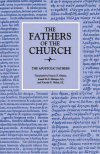
The first volume of the Fathers of the Church series presents the Apostolic Fathers translated into English with introductions setting the background for each writing and the history of its manuscripts. The Apostolic Fathers includes the writings of St. Clement of Rome, St. Ignatius Antioch, St. Polycarp, the Didache, the Letter of Barnabas, the Shepherd of Hermas, the Letter to Diognetus, and the Fragments of Papias.
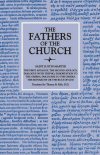
The First Apology, The Second Apology, Dialogue with Trypho, Exhortation to the Greeks, Discourse to the Greeks, The Monarchy of the Rule of God
- Author: Justin Martyr
- Translator: Thomas B. Falls
- Series: Fathers of the Church
- Publisher: Catholic University of America Press
- Publication Date: 1965
- Pages: 486
Justin Martyr, of the early second century AD, was well educated at a young age, and as an adult, pursued the philosophies and intellectual paths of the Greeks in search of the truth that governs the universe. Upon encountering the Christians, Justin quickly converted, finding no other “sure and useful philosophy” as Christianity. Once a Christian, he put all of his energy into spreading the gospel, and continued to engage on philosophical grounds with those he met—of all walks of life. These writings reflect the very first philosophical Christian writings—including the first philosophical exposition of the Logos and the first attempt to reconcile faith and reason.
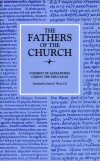
Christ the Educator
- Author: Clement of Alexandria
- Translator: Simon P. Wood
- Series: Fathers of the Church
- Publisher: Catholic University of America Press
- Publication Date: 1954
- Pages: 332
Clement brings us a rich and stimulating study of Christian thought from the second century AD, in which we find a loyal devotion to Christianity, even if he steps outside of the orthodox tradition. In Christ the Educator, Clement sets down general principles of the idea of paidagogos in our relationship with Christ. Christ is our teacher, and we are but little ones sitting at his feet. The Alexandrian inserts his own cultural ideas of education and spirituality into the mix, presenting the concept of Christ as educator in terms appropriate to his audience—terms which are still meaningful today.
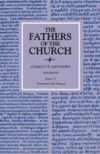
Stromateis, Books 1–3
- Author: Clement of Alexandria
- Translator: John Ferguson
- Series: Fathers of the Church
- Publisher: Catholic University of America Press
- Publication Date: 1991
- Pages: 368
Titus Flavius Clemens Alexandrinus (ca. AD 150–215) wrote the Stromateis, possibly the third work in his trilogy—the Protrepticus, the Paedagogus, and the Stromateis—to direct Christian Gnostics toward the third stage of philosophy—gnosis. For Clement, the only true gnosis was that which presupposed the faith of the Church, that is, apostolic and divinely revealed. But for Clement, the ideas of Greek philosophy were also a divine gift to mankind. All of his writings reflect this reconciliation of faith and knowledge.
The full title of the Stromateis is Miscellanies of Notes of Revealed Knowledge in Accordance with the True Philosophy, and the word stromateis itself means a kind of patchwork quilt. Clement describes the work as a somewhat unorganized collection of flowers or trees that have grown together naturally. Of the eight books some are fragmented or incomplete, but all show Clement as philosopher, theologian, and biblical commentator.
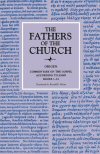
Commentary on the Gospel According to John, Books 1–10
- Author: Origen
- Translator: Ronald E. Heine
- Series: Fathers of the Church
- Publisher: Catholic University of America Press
- Publication Date: 1989
- Pages: 355
Origen composed at least 32 books of a commentary on the Gospel according to John, at the request of St. Ambrose of Milan. Of these, only nine books are extant in almost complete form, although we have selections of others persevered in other collections of the works of Origen. The commentary proceeds verse by verse, and is particularly notable for its emphasis on the spiritual meaning of the Gospel.
This volume contains books 1, 2, 6, and 10, and fragments of books 4 and 5. Origen’s main interest is the allegorical interpretation of the Gospel according to John, which makes this an important work in the study of Origen's mystical thought. A secondary interest is the refutation of Valentinian gnosticism. According to Eusebius, Ambrose had been a Valentinian before his conversion by Origen, and Origen refers to the Gnostic writer Heracleon regularly throughout the commentary in order to refute his views.
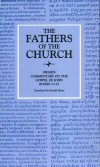
Commentary on the Gospel According to John, Books 13–32
- Author: Origen
- Translator: Ronald E. Heine
- Series: Fathers of the Church
- Publisher: Catholic University of America Press
- Publication Date: 1993
- Pages: 448
This volume contains what remains of Books 13–32 of Origen’s Commentary on the Gospel according to John, and thus completes the publication of the first full English translation of this work that stands as the beginning of Christian scriptural exegesis. Ronald Heine introduces his translation with a discussion of the times and circumstances within which the commentary was composed. He also provides a survey of the major theological questions with which the commentary is concerned. These include Origen’s thought on the nature of God, the person and work of Christ, his relation to the Father and to the created order, his teaching on the Holy Spirit, the Resurrection, and eschatology, and his ideas on the devil.
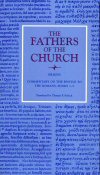
Commentary on the Epistle to the Romans, Books 1–5
- Author: Origen
- Translator: Thomas P. Scheck
- Series: Fathers of the Church
- Publisher: Catholic University of America Press
- Publication Date: 2001
- Pages: 424
Origen of Alexandria’s Commentary on the Epistle to the Romans is the oldest extant commentary on Romans (ca. 246). This volume presents the first English translation of the commentary, covering his exegesis of Rom 1:1 to 6:11. One of his longest and most mature works, it is the only commentary of Origen available in a coherent form from beginning to end. The work was originally composed in Greek in Caesarea, but only fragments of the archetype have survived. Fortunately, Origen’s admirer Rufinus of Aquileia translated the work into Latin (ca. 406).
Origen’s exegesis predates the controversy between Augustine and Pelagius by 170 years; thus it offers a striking perspective on Romans. Opposition to Gnostic interpretations of Paul is an important characteristic of the commentary. Above all Origen defends the Church against the “doctrine of natures”—the belief that all human beings are born with unalterable natures, either good or evil, and thus bound for either salvation or damnation, and that their conduct during this life cannot alter their destiny. Origen successfully refutes this teaching, showing that freedom of will always abides in rational beings.
Provoked by Marcion’s repudiation of the Old Testament, Origen emphasizes the harmony between Gospel and Law. He highlights as one of Paul’s main themes in Romans the transfer of religion from Judaism to Christianity, from the letter to the spirit, in terms both of salvation history and of the transformation of the individual. Origen claims that the key to unlocking Romans is understanding Paul's use of homonyms—identical expressions such as law, Jew, circumcision, death, etc., with divergent meanings.
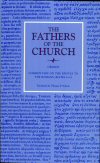
Commentary on the Epistle to the Romans, Books 6–10
- Author: Origen
- Translator: Thomas P. Scheck
- Series: Fathers of the Church
- Publisher: Catholic University of America Press
- Publication Date: 2002
- Pages: 340
This volume completes the first English translation of Rufinus’s Latin version of Origen of Alexandria’s Commentary on the Epistle to the Romans and contains Origen’s detailed exegesis of Romans 6:12–16:27. Origen’s much neglected Commentary, which stands out in splendid isolation at the fountainhead of Greek and Latin exegesis, is now completely accessible to English readers.
In Books 6–10, Origen carries through to completion his program, begun in Books 1–5, of defending human freedom and of opposing the natural predestinarian doctrine of the sects founded by the Gnostic heretics Marcion, Valentinus, and Basilides. These schools relied heavily on texts from Paul, interpreted in isolation from the rest of Scripture, not only to deny free will but to support the doctrine that salvation is determined by the nature one receives at birth, whether good or evil. In contrast Origen clarifies passages in Romans by citations from Paul’s other letters, from the Gospels, and from the Old Testament. He attempts to construct a coherent and unified “biblical theology.” Origen views human beings as chosen or rejected by God deservedly; everyone has it within his own power whether he becomes a servant of God or of sin, a vessel of wrath or of mercy.
Whether one sympathizes with Origen’s interpretations or finds them infuriating, it is difficult not to admire his concordance-like mind at work as he tackles the apostle Paul’s greatest epistle. Readers will find interesting and thought-provoking discussions of all the important theological themes and terms of Romans: faith, hope, love, works, justification, election, law, Israel, Gentiles, Church, sin, death, flesh, body, glory, etc. The importance of these discussions is magnified by the fact that they stand alone in their detail and breadth and stem from the Church’s most important theologian of the third century. Moreover, because Origen’s work was productive in subsequent centuries in Rufinus’s Latin translation, the Commentary is of outstanding importance for the history of New Testament exegesis.
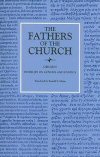
Homilies on Genesis and Exodus
- Author: Origen
- Translator: Robert E. Heine
- Series: Fathers of the Church
- Publisher: Catholic University of America Press
- Publication Date: 1982
- Pages: 434
Origen, son of the martyr Leonides, oldest in a family of seven children was born probably at Alexandria 184/85 and died probably in Tyre 253/54 after imprisonment and torture during the Decian persecution. Surnamed “man of steel,” Origen was an outstanding theologian of the early Greek-speaking Church, a man of the virtue and a genius with a prodigious capacity for work, an excellent teacher to whose lectures students flocked “and did not give him time to breathe for one bath of pupils after another kept frequenting from morn till night his lecture-room” (Eusebius, H.E. 6, 15).
As an author Origen surpasses all the writers of the Early Church in literary output. A list complied by Eusebius, now unfortunately lost, credited Origen with some 2000 books. Even a far shorter list known to St. Jerome and mentioned by him in his Letter To Paula giving the number of 786 works is still impressive. Jerome then goes on to add some reflections. “Do you see the Greeks and Latins outstripped by the work of one man? Who could ever read all that he wrote? What reward did he receive for this exertion? He is condemned by bishop Demetrius; except for the bishops of Palestine, Arabia, Phoenicia and Achaia the world concurs in his condemnation. Rome itself convokes an assembly against this man not because of novelty of teachings, not because of heresy as now mad dogs pretend against him, but because they could not bear the fame of his eloquence and learning and were considered speechless when he spoke.”
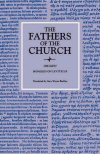
Homilies on Leviticus, 1–16
- Author: Origen
- Translator: Gary Wayne Barkley
- Series: Fathers of the Church
- Publisher: Catholic University of America Press
- Publication Date: 1990
- Pages: 312
This new translation of Origen’s Homilies on Leviticus may be read as a companion to Ronald E. Heine’s translation of Origen’s Homilies on Genesis and Exodus, volume 71 in the Fathers of the Church series. Both volumes reveal Origen’s tenacious belief that, although the meaning of Scripture was threefold, that is, literal, moral, and spiritual, the most important interpretation was the spiritual.
The Homilies on Leviticus were delivered during a three-year cycle between 238 and 244 in Alexandria where Origen was a brilliant teacher, theologian, churchman, and exegete until his imprisonment and torture under Decian and his reluctant death in Tyre in 253/254. They were translated by Rufinus, who admitted to having changed the text by condensing the homilies and, at the same time, expanding some of the explanations. Nevertheless they provide valuable insights on the third-century Church, touching on topics of conversion from sin, works of piety, baptism, Lent and fasting, the ordination of a priest, and the process of Christian discipline. Perhaps Origen’s most significant theological contribution, however, is his doctrine of the Trinity which influenced the Trinitarian debates of the fourth and fifth centuries.
Origen was the most prolific writer of the Early Church. Eusebius numbers his books at 2000, and St. Jerome writes of 786 works. But Origen’s chief aim, as an interpreter of the Scriptures, was to draw out the historical meaning of the text and communicate that wisdom of perception to his flock. It was this that inspired his profound spiritual interpretation in the Homilies on Leviticus so finely translated in this volume.
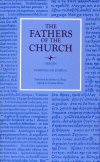
Homilies on Joshua
- Authors: Origen
- Translator: Barbara J. Bruce
- Series: Fathers of the Church
- Publisher: Catholic University of America Press
- Publication Date: 2002
- Pages: 240
These homilies were among the last Origen gave before his torture and death during the Decian persecution, around 254.
With the saga of the Israelites entering and possessing their promised land, Origen unfolds the story of the Christian life from baptism to resurrection. He exhorts his hearers to persevere in their own struggles to overcome the enemies of their souls and obtain their own inheritance. Their leader is Jesus, the Son of God, who is prefigured in Jesus (Joshua), the son of Nun. All battles, victories, and defeats happen within the individual; all aspects of the Law and temple become but shadows of the fulfilling work of God in Jesus Christ. The story brims with allegory and passion, a passion for the people and for their priests who, “standing near the blazing fire of the altar,” must illuminate the path for others.
As Origen exhorted, others wrote down his words, words he had asked the people to pray for and the Spirit to supply. Most of the original writings in Greek were lost during the centuries when Origen was officially defamed. What we have today is the Latin translation by Rufinus, the basis of the translation in this volume. In the Introduction, Barbara J. Bruce discusses and affirms the reliability of the Latin text, and briefly looks at Origen’s ministry, his concept of the nature of Scripture, and his method of interpretation.
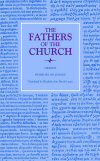
Homilies on Judges
- Author: Origen
- Translator: Elizabeth Ann Dively Lauro
- Series: Fathers of the Church
- Publisher: Catholic University of America Press
- Publication Date: 2009
- Pages: 152
In his General Audience of May 2, 2007, Pope Benedict XVI praised Origen for his “primordial role” in the history of lectio divina, the prayerful reading of Scripture. He explained that Origen approaches Scripture reading not as “mere study” but as the pathway to knowing Christ and “falling in love with him.” Origen’s nine extant homilies on Judges exemplify this approach.
In them, Origen calls his audience to participate in a loving relationship with Christ through interaction with Scripture. Delivered sometime between 238 and 248, these homilies expound on themes extracted from Judges 2–7. Some of the homilies focus generally on God’s redemption of Israel through judges after each cycle of sin, enslavement, and repentance, while others stress that victory belongs to God alone through events such as the defeat of the Midianites by Gideon’s meager army of 300 men, Gideon’s test with the fleece, and the murder of the Philistine general Sisera by the woman Jael. The homilies brim with hope in Christ’s ultimate victory over sin and death, a hope that is specific to the individual believer but accessible only within the Church.
Origen applies his allegorical method of Scriptural interpretation to these passages, sometimes drawing faith-enriching meaning from the literal (somatic) sense as well as from one or both of the two figurative (psychic and pneumatic) senses. Using both allegory and typology, Origen shows his audience God’s abundant mercy and grace, the power of Scripture to assist in the battle against sin and the promotion of virtue, and the church leader’s duty to walk his flock through the transforming terrain of Scripture toward likeness to and union with Christ.
Largely because of early controversies over Origen’s legacy, these homilies are extant only in Rufinus’s fourth-century Latin translation, but his ability to capture Origen’s meaning and spirit is well documented. This is the first-ever English translation of Origen’s homilies on Judges.
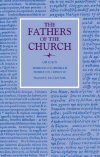
Homilies on Jeremiah and I Kings 28
- Author: Origen
- Translator: John Clark Smith
- Series: Fathers of the Church
- Publisher: Catholic University of America Press
- Publication Date: 1998
- Pages: 379
Souls existing before their bodies, witches summoning dead prophets from the underworld, the return of the damned—and the Devil himself—to God in the end, and many other theological speculations surprise the reader of Origen’s Homilies on Jeremiah and I Kings 28. Some of these very theses of the third-century priest from Alexandria, Egypt, were condemned in the Second Council of Constantinople. But plumbing the mystical depths of the Prophecy of Jeremiah is the central point of the homilies.
Presented in this volume are the remains of 22 homilies and a collection of fragments delivered by Origen around AD 240. The original texts of the homilies on Jeremiah have not come down to us completely; two of the homilies survive only in a Latin translation of St. Jerome. The homily on I Kings 28, while not a part of the homilies on Jeremiah, deals with the Witch of Endor and has been added to this volume in virtue of its own inherent interest.
In this collection, Origen seeks understanding of the significance of the hostility of the Chosen People towards the Prophet Jeremiah before their captivity in Babylon. Origen in many ways identified with the great prophet and thought of Jeremiah as a type for Christ in the Hebrew Scriptures. Origen realized that Jeremiah came at a crucial time in the history of Israel, the time of captivity, and he views this event and the events around it as pregnant with meaning for the people of his time.
Watching a master grapple with admittedly difficult, obscure texts and give them compelling, forceful delivery must have impressed Origen’s congregation. Readers will find it no less engaging to read his homilies now and experience some of that exhilaration of hearing a true expert highlight every subtlety of the pericope and make plain what once was obscure.
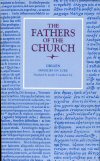
Homilies on Luke
- Author: Origen
- Translator: Joseph T. Lienhard
- Series: Fathers of the Church
- Publisher: Catholic University of America Press
- Publication Date: 1996
- Pages: 285
Thirty-nine of Origen’s homilies on the Gospel of Luke survive in Jerome’s Latin translation. Origen preached them in Caesarea, perhaps around 234 or 240, to a congregation of catechumens and faithful. Most of the homilies are short; on average, they treat about six verses of the Gospel and would have lasted between eight and twelve minutes. The first 33 homilies treat chapters one through four of Luke’s Gospel; the remaining six treat passages from the tenth to the twentieth chapters.
Origen’s homilies are the only extant patristic writing devoted to Luke’s Gospel before Ambrose’s Exposition on Luke, written ca. 390 (and Ambrose himself followed Origen, sometimes quite closely). Homilies 1 to 20 also constitute the only existing commentary from the pre-Nicene Church on either Infancy Narrative. Several hundred fragments of Origen’s homilies and commentary on Luke also survive, mostly in Greek.
Henri de Lubac formulated the important principle, “Observe Origen at work,” and Origen’s writings on Luke’s Gospel are an intriguing place to do that. Origen, the champion of spiritual interpretation, regulary beings with a painfully literal reading of the text. His first unit of understanding is the word, and often the key that unlocks the meaning of a word in the Bible for him is the use of that same word elsewhere in Scripture. Origen assumed that each word had a meaning that is both profound and relevant to the reader—for the Holy Spirit is never trite and what the Holy Spirit says must always touch the hearer.
This volume, the first English translation of the extant homilies and of fragments from the commentary on Luke, is an important addition to the growing body of Origen’s work now available in English.
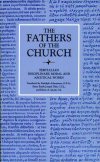
Disciplinary, Moral, and Ascetical Works
- Author: Tertullian
- Translator: Rudolph Arbesmann
- Series: Fathers of the Church
- Publisher: Catholic University of America Press
- Publication Date: 1959
- Pages: 353
Tertullian’s philosophical writings laid the foundation for Latin Christian literature, establishing a standard for doctrinal and practical writings of the ancient church. This volume contains a number of his practical and disciplinary writings, demonstrating his austere devotions and methods of maintaining self-control. He praised the unmarried state of life, condemned the remarriage of divorcees, insisted against the austentatious display of wealth, but was criticized for being misogynistic and taking asceticism too far in some instances. These works include:
- To the Martyrs
- Spectacles
- The Apparel of Women
- Prayer
- Patience
- The Chaplet
- Flight in Time of Persecution
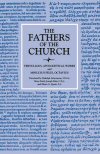
Apologetical Works; Octavius
- Authors: Tertullian and Minucius Felix
- Translator: Rudolph Arbesmann
- Series: Fathers of the Church
- Publisher: Catholic University of America Press
- Publication Date: 1950
- Pages: 449
Tertullian (ca. 150–222 AD) is the father of Latin-language Christian apologetics, and of Latin Christianity as a whole. Known for being the earliest known Latin writer to use the term “Trinity,” Tertullian left an important legacy for the ancient church in Apologeticus, where he proclaimed freedom of religion as an inalienable human right and that Christians should have a fair trial before they are condemned to death. His experience as a lawyer and his extensive training in medicine, law, and culture, provided him the background he needed to defend Christianity and establish a strong foundation for the future of Christian literature and philosophy.
Minucius Felix, another early Latin Christian apologist of unknown date, is exclusively known for his Octavius, a dialogue between the pagan Caecilius Natalis and the Christian Octavius Januarius.
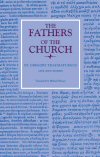
Life and Works
- Author: Gregory Thaumaturgus
- Translator: Michael Slusser
- Series: Fathers of the Church
- Publisher: Catholic University of America Press
- Publication Date: 1998
- Pages: 218
Born of an aristocratic pagan family at Neocaesarea in Pontus at the beginning of the third century, St. Gregory received his early training in literature and rhetoric in his birthplace. While visiting Caesarea in Palestine, he chanced to hear the Christian philosopher and theologian Origen and remained there for five years as his pupil. Deeply influenced by Origen, Gregory returned to Pontus a convinced Christian and became the first bishop of Neocaesarea. His dedication greatly influenced his people, and he became known as “Gregory the Great,” “the Teacher,” or “the Wonderworker.”
St. Gregory’s influence is clear from the many Lives (or narrations) that circulated in the fourth and fifth centuries, the prayers and invocations that asked for his patronage, and his place in Eastern canon law. Of his life, however, not much is known. No manuscript collection of his writings was made in antiquity.
This volume presents the earliest and most important Life of Gregory Thaumaturgus, preached by St. Gregory of Nyssa, and all the works that can be attributed to Gregory Thamumaturgus himself. It includes his Address of Thanksgiving to his teacher Origen; his Christian adaptation and interpretation of the Old Testament book of Ecclesiastes; his regulations restoring order in the Christian community after an invasion by the Goths; a remarkable treatise on God's ability to suffer and another on the Trinity; and two small texts that may or may not have been written by him.
This is the first time that these texts have been brought together in any language. The extensive introduction and notes offer readers an unprecedented opportunity to learn about “the Wonderworker.”
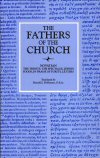
The Trinity, The Spectacles, Jewish Foods, In Praise of Purity, Letters
- Author: Novatian
- Translator: Russell J. DeSimone
- Series: Fathers of the Church
- Publisher: Catholic University of America Press
- Publication Date: 1974
- Pages: 232
After Novatian’s break with the Church over the treatment of Christians who had lapsed in the persecution of Decius (AD 250–52), Church authorities were reluctant to recognize officially his contributions to Christian theology. Because his writings were too valuable to ignore, a number of them were attributed to less controversial authors. On the basis of stylistic and other internal evidence, scholars have been able to retrieve Novatian’s work from obscurity and to give him recognition as a pioneer of Roman Latin theology.
This volume presents translations of all Novatian’s surviving writings, which appear together in English for the first time under their author’s name. The collection opens with the work that most clearly defines him as a theologian of central importance: The Trinity. This treatise refuted current heresies concerning Christ’s dual nature and God’s total spirituality.
The collection also contains a trilogy of pastoral letters: In Praise of Purity, The Spectacles, and Jewish Foods. Novatian, absent from his community, writes to his adherents about current problems in Christian morality and encourages them to remain faithful to the Gospel. In the three letters, written to Cyprian Bishop Carthage after the martyrdom of Pope Fabian, Novatian speaks for the Church at Rome. They are an important source for the study of Penance as practiced by the early Church. Novatian insisted that those who had denied Christ during the persecution should be most strictly dealt with. There is little in him of Cyprian’s conciliatory tone. Novatian’s Letters illumine a third-century controversy that offers new perspectives for modern re-examination of the sacrament.
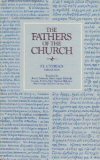
Treatises
- Author: Saint Cyprian
- Translator: Roy J. Deferrari
- Series: Fathers of the Church
- Publisher: Catholic University of America Press
- Publication Date: 1956
- Pages: 387
This volume presents several treatises of St. Cyprian in translation. To Donatus (Ad Donatum) is a monologue written shortly after Cyprian’s baptism in 246 in which he extols his spiritual rebirth in the sacrament of baptism. Literary criticism has come to view this treatise as a model for St. Augustine’s Confessions. The Dress of Virgins (De habitu virginum) written in 249 is addressed to women (“flowers in the Church’s garden”) who have dedicated their lives to God’s service. In this treatise on virginity Cyprian warns these women against seeking finery and the pitfalls of worldliness.
The Fallen (De lapsis), written in 251, deals with the problems encountered in reconciling with the Church those who had defected during the time of persecution. These problems were acute especially after the Decian persecution. The Unity of the Catholic Church (De unitate ecclesiae), written very likely in 251, is directed in the first place against the Novatian schism. This treatise contains the famous words: “He cannot have God for his father who does not have the Church for his mother.”
The Lord’s Prayer (De oratione dominica) is as the title indicates a commentary on the Our Father. Many of its words and phrases remind one of Tertullian whom Cyprian admired greatly. To Demetrian (As Demetrianum) is a vigorous defense of Christianity against pagan calumnies. Mortality (De mortalitate) written perhaps in 252 or later has often been described as being a pastoral letter of a bishop to comfort and console his flock during a time of trial and tribulation.
Work and Alms (De opere et eleemosynis) is a treatise that may have been written in 252 or even later. It is a warm and heartfelt exhortation of a bishop to his flock encouraging them to do good works. The Blessing of Patience (De bono patientiae), written sometime during the year 256, has frequently been described as a sermon delivered during the controversy over the validity of heretical baptism in northern Africa.
Jealousy and Envy (De zelo et livore) like the preceding treatise greatly resembles a sermon delivered on the topic in the title. It was probably written between 251 and 257. To Fortunatus (Ad Fortunatum), a work replete with quotations from Scripture to encourage a Christian in time of persecution, was probably written between 253 and 257. In its original Latin this treatise is an important witness to the text of the Bible before St. Jerome’s revisions. That Idols are not Gods (Quod idola dii non sint) is a relatively unimportant work when judged on the basis of its content. Modern patristic scholars seriously doubt its authenticity.
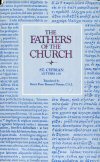
Letters 1–81
- Author: Saint Cyprian
- Translator: Rose Bernard Donna
- Series: Fathers of the Church
- Publisher: Catholic University of America Press
- Publication Date: 1964
- Pages: 368
St. Cyprian’s works fall naturally into two groups: treaties (sermons, libelli, tractus) and letters (epistulae). This volume features his letters, of which 81 have come down to us, written from c. 249 until his death in 258 AD.
They give a penetrating insight into the affairs of the Church in Africa in the middle of the third century. They reveal problems of doctrine and of discipline which had to be decided in a period of crisis and persecution when the Church, still in its infancy, had not yet emerged from the catacombs. Most important of all, they make Cyprian vividly alive as an understanding bishop who could be both gentle and firm, enthusiastic and moderate. He was prudent enough to go into exile to direct his flock from afar when his presence was a potential source of danger to the people; he was courageous enough to face martyrdom that he knew would ultimately be his.
Of these letters, 59 were written by Cyprian himself and six more, emanating from Carthaginian Councils or Synods, were largely his work also. 16 letters were written by others; apparently 11 were lost.
St. Cyprian’s prestige and influence was great in Christian antiquity. Unfortunately, he is not well known or as widely read in modern times as he deserves. This is probably due to Cyprian’s lack of complete orthodoxy, in the modern sense of the word, regarding the recognition of the See of Peter and the rebaptism of heretics. The modern reader must bear in mind that the period of the Fathers was the time of the laying of the foundation of so much which we accept and see so clearly today. In any case, both Lactantius (Div. Inst. 5.1.24) and St. Augustine (De bapt. contra Donatistas), while acknowledging the weaknesses of St. Cyprian’s stand on the questions mentioned, do not in the slightest detract from their respect and admiration for their fellow countryman. Prudentius pays St. Cyprian the following tribute in his Peristephanon 13.5.6 ff.:
As long as Christ will allow the race of men
to exist and the world to flourish,
As long as any book will be, as long as there
Will be holy collections of literary works,
Everyone who loves Christ will read you, O
Cyprian, will learn your teachings.
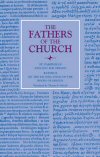
Apology for Origen: with On the Falsification of the Books of Origen
- Authors: Saint Pamphilus and Rufinus
- Translator: Thomas P. Scheck
- Series: Fathers of the Church
- Publisher: Catholic University of America Press
- Publication Date: 2010
- Pages: 164
Presented here for the first time in English translation (from Rufinus’s Latin version) is the Apology for Origen, the sole surviving work of St. Pamphilus of Caesarea (d. 310 AD), who was one of the most celebrated priest-martyrs of the ancient Church. Written from prison with the collaboration of Eusebius (later to become the bishop of Caesarea), the Apology attempts to refute accusations made against Origen, defending his views with passages quoted from his own works. Pamphilus aims to show Origen’s fidelity to the apostolic proclamation, citing excerpts that demonstrate Origen’s orthodoxy and his vehement repudiation of heresy. He then takes up a series of specific accusations raised against Origen’s doctrine, quoting passages from Origen’s writings that confute charges raised against his Christology. Some excerpts demonstrate that Origen did not deny the history of the biblical narratives; others clarify Origen’s doctrine of souls and aspects of his eschatology. Pamphilus was beheaded on February 16, 310, under the emperor Maximinus Daia.
In 397 AD, at the urgent invitation of his friend Macarius, Rufinus of Aquileia translated Pamphilus’s Apology into Latin, the first of his extensive translations of Origen’s writings. Rufinus probably did not suspect the incomparable importance of his undertaking, but by translating Origen he saved from impending ruin some of the most precious monuments of Christian antiquity, destined to form Latin minds for many years to come.
Also presented in this volume is a new English translation of Rufinus’s work, On the Falsification of the Books of Origen in which Rufinus sets forth arguments for his theory that Origen’s writings had suffered interpolations by heretics. Rufinus demonstrates that literary frauds and forgeries carried out by heretics were widespread and affected many writers. He may have been misled by his intense respect for Origen’s genius, and he certainly exaggerated when he claimed that all the doctrinal errors to be met with in Origen’s works were due to interpolations.
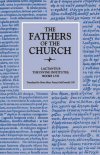
The Divine Institutes, Books I–VII
- Author: Lactantius
- Translator: Mary Francis McDonald
- Series: Fathers of the Church
- Publisher: Catholic University of America Press
- Publication Date: 1964
- Pages: 586
The most important writing of Lactantius, The Divine Institutes was written between 303 and 311. Intended to point out the futility of pagan beliefs juxtaposed next to the reasonableness and truth of Christianity, this major work is one of the earliest systematic apologetic works written. According to the Catholic Encyclopedia, “It was the first attempt at a systematic exposition of Christian theology in Latin, and though aimed at certain pamphleteers who were aiding the persecutors by literary assaults on the Church, the work was planned on a scale sufficiently broad enough to silence all opponents.”
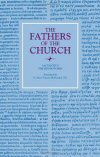
The Minor Works
- Author: Lactantius
- Translator: Mary Francis McDonald
- Series: Fathers of the Church
- Publisher: Catholic University of America Press
- Publication Date: 1965
- Pages: 251
Lactantius lived through one of the greatest turning points in the history of Europe. It has been aptly described as the moment when the old world of paganism was in travail, when against its will it gave birth to the Christian Empire. The writings of this author are, together with those of Eusebius, the principal sources for the period of the great persecution of Diocletian and for the first years of the peace of the Church after the Edict of Milan. For the period of the Council of Nicaea, there is somewhat more abundant source material, but for the years 312–324 reliance must be made upon Eusebius and Lactantius. Both may be considered to have written with considerable bias. They are too extravagant in praise of Constantine; Lactantius especially manifested an odium theologicum toward Galerius and the persecutors. Their works are still of high value, however, as historical sources. From the time of the studies of Maurice, moreover, the evidence of numismatics has verified the historical accounts of these contemporary sources.
The writings of Lactantius, therefore, were composed in one of the most eventful epochs of ecclesiastical history. The Church, after suffering the most sever of despotic persecutions, was suddenly received under state protection and began to enjoy, not merely tranquility and legal status, but even a considerable portion of political influence. The fourth century saw the great fusion of the Christian Church with the Roman state and Hellenistic culture, the fusion which was to spell out Western civilization and determine its achievements.
Perhaps no other writer is more completely revealing of his own times. As pagan rhetoricians were abandoning the schools and the philosophers, the culture of the world was bring saved in the very Church that was charged with its destruction. Lactantius is a sharer of Minucius Felix’s attitude toward traditional culture. He believed that it possessed a vitality, that its treasure should be preserved, that the “spoils of the Egyptians could become the pride of the despised Galilaeans.” In the very act of despoiling them, however, he assigned himself the task of addressing those Egyptians and, in a number of essential features, accepted their own literature and learning. In this way, he saved much of their culture for the Church and became thereby one of the founders of Christian humanism.
Reviews
0 ratings
Fr. Robert
8/4/2019
Two Catholic editions of the Early Church Fathers were produced during this time period, This is a very readable edition, for everyone, the other set produced first by the Newman Press, and after they went extinct continued by the Paulist Press is a bit more suited to those who have more advanced Theological Studies. A great set for Lay Discussion groups, or sermon prep. The language is more up to date English usage than the monumental Hicks volumes which have a Reformation slant to them, Unlike the Hicks edition which includes many Apocryphal texts rejected by both Protestants and Catholics, This edition eliminates the guess work on what is and is not suspect.